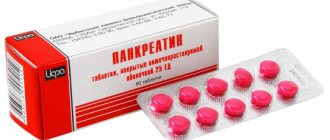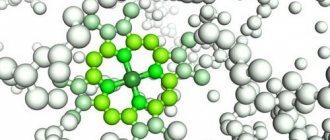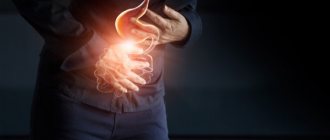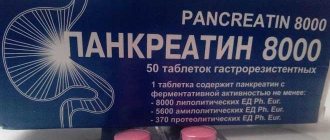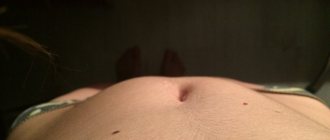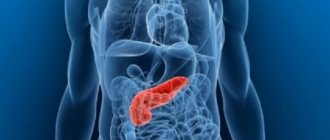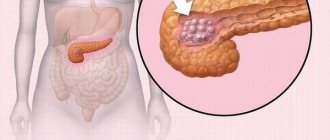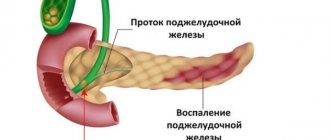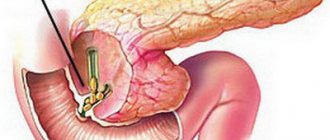Pancreatin is the main substance obtained from the pancreas of livestock, containing the necessary digestive enzymes.
It is the basis of a large group of enzyme products, some of which additionally include dry bile and cellulose. Pancreatin for pancreatitis is used in the form of a drug with a similar trade name. Produced only in tablets coated with a protective coating. The medicine contains enzymes that help support the functions of the weakened gland of a sick person, restore impaired digestion of food and the flow of nutrients into the bloodstream. Most often, the need arises during an inflammatory process in the organ - pancreatitis.
How to take it for pancreatitis
Prescribed to improve digestion, eliminate painful symptoms, and normalize pancreatic functions. The organ stops producing enzymes necessary for the complete breakdown of food. Pancreatin replenishes enzyme deficiency, normalizing the functioning of the gastrointestinal tract. Tablets are taken for various diseases of the digestive system, as well as to prevent exacerbation and development of the disease in healthy people under the influence of spicy, fatty, salty foods.
Of course, you can take the drug for pancreatitis, but you need to do it correctly. It is prohibited to carry out therapy in the acute form, during the period of exacerbation. Pancreatin is a remedy for the treatment of chronic forms in remission. Most often prescribed to normalize digestion after acute attacks or to prevent them.
Causes of pain in the pancreas
When the pancreas hurts and the reasons that gave rise to this pathology, all this requires a correct understanding of what medications to take and what the pathology threatens a person with. Among the causes of inflammation of the pancreas, digestive tract disorders are noted. In this case, a malfunction in the production of enzymes occurs, blocking the channels of pancreatic juice, which leads to serious complications and necrosis of the digestive organs. The development of pancreatic disease requires the correct prescription and administration of medications, which is the key to the speedy restoration of gastrointestinal functions.
The second reason is the abuse of bad habits, which provokes intoxication of the body and disruption of enzyme production. In addition, alcohol causes spasm of the valve of Oddi, which is blocked and leads to painful symptoms of pancreatitis.
The third reason will be infections of the digestive organs, which also leads to exacerbation and inflammation of the pancreas and, accordingly, to the development of the pathology of pancreatitis. The fourth reason is obesity. This reason for the development of pancreatitis and pain syndrome is a malfunction of the gastrointestinal tract, an increased content of fats in the blood, creating plaques in the vessels, which impedes blood flow and the secretion of pancreatic juice, and this is the worst cause of pancreatitis.
For preventive measures, see a gastroenterologist once every six months and have your body diagnosed for the development of pancreatitis and other pathologies that can cause pain. Follow a healthy diet and give up bad habits.
The main sign of pancreatitis is severe pain in the abdominal area. Unpleasant symptoms force the patient to take painkillers for pancreatitis of the pancreas.
In the event of painful conditions, it is important to correctly prescribe medications that can eliminate the discomfort, at least for a short time. Pain relief affects the elimination of pain symptoms and the treatment of the disease itself.
- in case of alcohol consumption;
- as a result of intoxication of the body due to poisoning;
- if the food you eat is difficult to digest;
- due to exacerbation of gastrointestinal diseases;
- as a result of stressful conditions.
With pancreatitis, the stomach begins to hurt soon after eating. This happens when the pancreas is exposed to the greatest secretory load.
The duration of pain depends on the degree of organ damage and the nature of the inflammation.
- As a result of the blockage, the bile ducts become blocked.
- The walls of the organ swell and become inflamed.
- There are problems with blood supply.
- There is a lack of oxygen in the body.
- Structural changes in the organ begin.
Action
The active substances are not absorbed by the intestines and are excreted unchanged from the body in feces. They begin to act within a few minutes, maximum activity is observed after 45 minutes. Enzymes break down fats, starch, and proteins, speeding up the digestion of food. Thanks to the normal functioning of the digestive tract, heaviness, bloating, nausea, heartburn, belching, and flatulence disappear.
In severe cases of pancreatitis, the drug is taken every time after meals, since the pancreas cannot produce the necessary enzymes. With a moderate clinical picture, to prevent exacerbations, drink the drug 1-2 times a day. The therapeutic effect occurs almost immediately, but it is necessary to achieve stable remission and restoration of pancreatic function. A course of at least 2 weeks is required.
Indications
Prescribed for insufficient secretory function of the pancreas. The condition occurs with various diseases of the gastrointestinal tract, with the usual violation of the regime, consumption of fatty foods, poisoning, and intestinal infections.
General indications:
- Chronic pancreatitis;
- Inflammatory diseases of the gastrointestinal tract;
- Cystic fibrosis is a genetic disease with blockage of the pancreatic ducts;
- Duct obstruction;
- Pathological condition with impaired digestive functions;
- Sedentary lifestyle.
Start taking pills if you have:
- Heaviness in the stomach;
- Belching;
- Diarrhea or constipation;
- Bloating;
- Nausea;
- Flatulence;
- Heartburn.
Often, in the chronic form, it is taken to prevent exacerbation after a hearty dinner, a hearty lunch, or eating fried, spicy, salty, or fatty foods.
Contraindications to taking the drug
The drug is not used for:
- Personal intolerance to the components of the medication.
- Acute pancreatitis.
- Hepatitis.
- Gallstone disease.
- Constant change in stool consistency - diarrhea is replaced by hard feces.
- Intestinal obstruction.
If the patient’s well-being worsens after taking the medication, it is imperative to consult a doctor to identify signs of the presence/absence of personal intolerance and decide on the possibility of further use of the drug.
Side effects
Is pancreatin harmful and can it be taken without a doctor’s prescription? This question interests many people suffering from periodic or chronic disorders of the functioning of the gastrointestinal tract. Many people think that since pancreatin consists of natural ingredients, taking it will not harm the body and you can experiment without consulting a doctor. It's a delusion.
In case of personal intolerance, the presence of accompanying diseases for which the drug is contraindicated, violation of the rules for the duration and dosage of using the drug, the following negative reactions may develop:
- diarrhea, constipation, nausea, pain in the upper abdomen, flatulence, bloating, change in color of stool, intestinal obstruction;
- negative immune response in the form of skin rash, redness, itching, sneezing, tearing from the eyes, bronchospasms, anaphylactic reactions;
- tachycardia;
- weakness;
- feeling of heat.
Complications
The drug is well tolerated and does not cause side effects when used correctly. Adverse effects occur with uncontrolled use of the drug, or overdose. The first sign that you need to stop treatment is diarrhea, an exacerbation of symptoms of pancreatitis. In addition, long-term use of the medication can lead to:
- Skin rashes;
- Increased uric acid in urine;
- Narrowing of the small intestine;
- Obstruction;
- The appearance of ulcers, erosions;
- Irritable bowel syndrome.
In most cases, the condition normalizes gradually after discontinuation of the drug; sometimes special treatment, even surgery, is required. Pancreatin itself is not dangerous to the body. Its metabolites quickly leave the body without disrupting the functions of systems and organs. Improper use of the medication can lead to dangerous consequences.
Dosage
In case of absolute pancreatic insufficiency, the daily requirement for lipase is 400,000 units. This situation occurs extremely rarely, so the correct dosage is selected individually. Start with a minimum dose - 1 tablet for each meal. An adult is allowed to take 18 pieces per day. Without consulting a specialist, you can take no more than 4 tablets per day. The duration of therapy depends on the severity of the disease, the minimum course is 7 days, the average is a month.
Traditional methods
It is impossible to treat pancreatitis exclusively with folk remedies, but decoctions and infusions can be used to replenish your body with useful substances. Most adults do not trust medications and try to replace them with time-tested folk recipes. There are varieties of herbs whose beneficial properties can have a calming effect on the pancreas and, accordingly, relieve or prevent pain. It is important to know that treating pancreatitis yourself (at home) is only possible if it is chronic. What herbs can be used for decoctions should be discussed with a specialist.
Instructions
The tablets should be drunk whole without chewing. It is forbidden to divide or break. Otherwise, efficiency decreases. Useful components will be neutralized by an acidic environment. Take with plenty of liquid. It is best to use non-carbonated mineral water. Consume during meals or immediately after a meal. Pancreatin is combined with other medications for the treatment of pancreatitis, folk remedies.
Pancreatin in acute form
Experts prescribe the drug when digestive functions are impaired. As for contraindications, one should take into account the fact that the clinical picture during an exacerbation can be different. If debilitating vomiting or severe diarrhea is observed, you should immediately contact a specialist. In this case, droppers of different mechanisms of action, drugs to reduce acidity, and many other medications are prescribed. In the first days, complete fasting is indicated, so there is simply no point in taking Pancreatin.
If the exacerbation is more like the subside of the acute form - nausea without vomiting, bloating, flatulence, heaviness in the stomach, heartburn, belching, drinking Pancreatin is allowed, but in acceptable doses - an average of 4 tablets per day. In this case, the duration of treatment will be no more than a month. At the same time, you should adhere to a diet and a proper lifestyle.
Other experts do not recommend using Pancreatin during an exacerbation, since premature enzymatic activity leads to irritation of the mucous membrane, inflammation, and disruption of digestive functions. In a healthy body, the pancreas produces enzymes in an inactive state. They calmly pass through the stomach, become active in the intestines, and begin digesting food. With pancreatitis, enzymes become active while in the stomach, beginning to digest the mucous membrane of the organ. This leads to inflammation, exacerbation of gastritis, and digestive problems.
Pancreatin in chronic form
Tablets are taken to prevent exacerbations when exposed to unfavorable factors - nervous breakdown, exhaustion, heavy food, alcohol, disrupted regimen, antibiotics. They also begin the course with minor manifestations of the disease - nausea, bloating, flatulence, diarrhea. If you do everything according to the rules, during an exacerbation you should take antacids and proton pump inhibitors to normalize acidity and restore the mucous membrane. After the painful symptoms disappear, take Pancreatin. But then the question arises, why drink it at all if digestive functions are restored.
Ideally, the medication is prescribed for pathological insufficiency of the pancreas, when it is unable to produce the necessary enzymes. The problem is that there is no effective treatment regimen for gastrointestinal diseases. After the first exacerbation, relapses follow, after which the disease becomes chronic. Therapy that is called qualified, in fact, is not.
For pancreatitis, cholecystitis
Inflammation of the gallbladder often accompanies pancreatitis, so treatment is carried out characteristic of this disease. The classic treatment regimen is 4 tablets per day for existing digestive problems. Before using the medication, you should consult a specialist. Self-treatment leads to side effects.
Special instructions:
- For long-term treatment, iron supplements are prescribed in parallel.
- Simultaneous use of antacids reduces the effectiveness of Pancreatin. If it is impossible to change the regimen, take a break between taking medications for at least 2 hours.
- In the treatment of pancreatitis, Domrid and Omez are often prescribed. You can take them together with Pancreatin. The first drugs are drunk 20 minutes before meals, enzymes - during the meal.
- After removal of the gallbladder, it is recommended to drink Pancreatin to improve digestion.
To achieve a therapeutic effect faster, you need to follow a diet and lead a healthy lifestyle. Perhaps then you won’t have to take enzymes for a long time.
In what cases is it advisable to use Pancreatin?
According to the instructions, the main reason for the need for such a remedy is a violation of the digestive processes due to insufficient production of its own digestive enzymes or dietary errors.
Why Pancreatin is prescribed can be found in the description of the drug. In this case, the remedy is relevant for:
- Defective functioning of the pancreas (with chronic pancreatitis, cystic fibrosis, death of a significant amount of organ tissue, recent surgery to remove part of the pancreas, etc.).
- Chronic inflammatory, destructive pathologies of the stomach, gall, intestines, liver, as well as after irradiation, surgery of these organs in case of digestive disorders, increased gas formation or stool disorders.
- Deterioration of food digestion in people with normal functioning of the gastrointestinal tract, due to errors in the diet (deviation from the diet in favor of eating too fatty, incompatible, poorly digestible, unusual food).
- Preparing the abdominal cavity for x-rays or ultrasound.
- Fibrous lesions of the pancreas.
- Pathologies of the digestive process, which appeared due to disruption of chewing processes, the patient’s prolonged stay in an immobilized state.
Regarding age restrictions, there is a generally accepted rule that Pancreatin can be prescribed to children from one and a half years old. In emergency situations, the doctor may decide to prescribe the drug to an infant younger than this age. In this case, it is necessary to accurately calculate the permissible dose of the medication based on the baby’s body weight, so as not to cause harm to the still fragile body.
The effect of pancreatin on the fetus is poorly studied, therefore, when carrying a child, the medication is prescribed only when the risk for the mother and the unborn baby is compared.
You can take the medicine while breastfeeding, as it does not pass into the blood or milk. However, a nursing mother must carefully follow the dosage.
Analogs
The pharmacy can offer a wide selection of analogues with the same active ingredient or similar effect.
- Enzibene
Enteric-soluble tablets with the active ingredient pancreatin. Take 2 pcs during, after, and before meals. The daily dose reaches 18 pieces, selected individually. Among the main contraindications, manufacturers indicate individual intolerance, acute pancreatitis.
- Hermital
It is produced in the form of capsules with different dosages of the active substance. The upper shell protects enzymes from the influence of an acidic environment. Not absorbed by the intestines, excreted in feces. It works on the basis of pancreatin hydrochloride. Indications and contraindications are similar.
- Zentase
The active substances of the enzyme medicine are protease, amylase, lipase. Breaks down fats, carbohydrates, proteins, helps digest food. Drink during or after meals. The dose is selected individually. Prescribed with caution to pregnant and lactating women. A direct contraindication is individual intolerance to the components.
In general, all analogs have an identical mechanism of action and contain the same active substances.
Other analogues:
- Kreazim;
- Creon;
- Mezim;
- Micrasim;
- Pangrol;
- Panenzyme;
- Panzinorm;
- Penzital;
- Festal.
The price of analogues is from 50 rubles. Up to 1000 rub. Available without a prescription, but consultation with a specialist is advisable.
